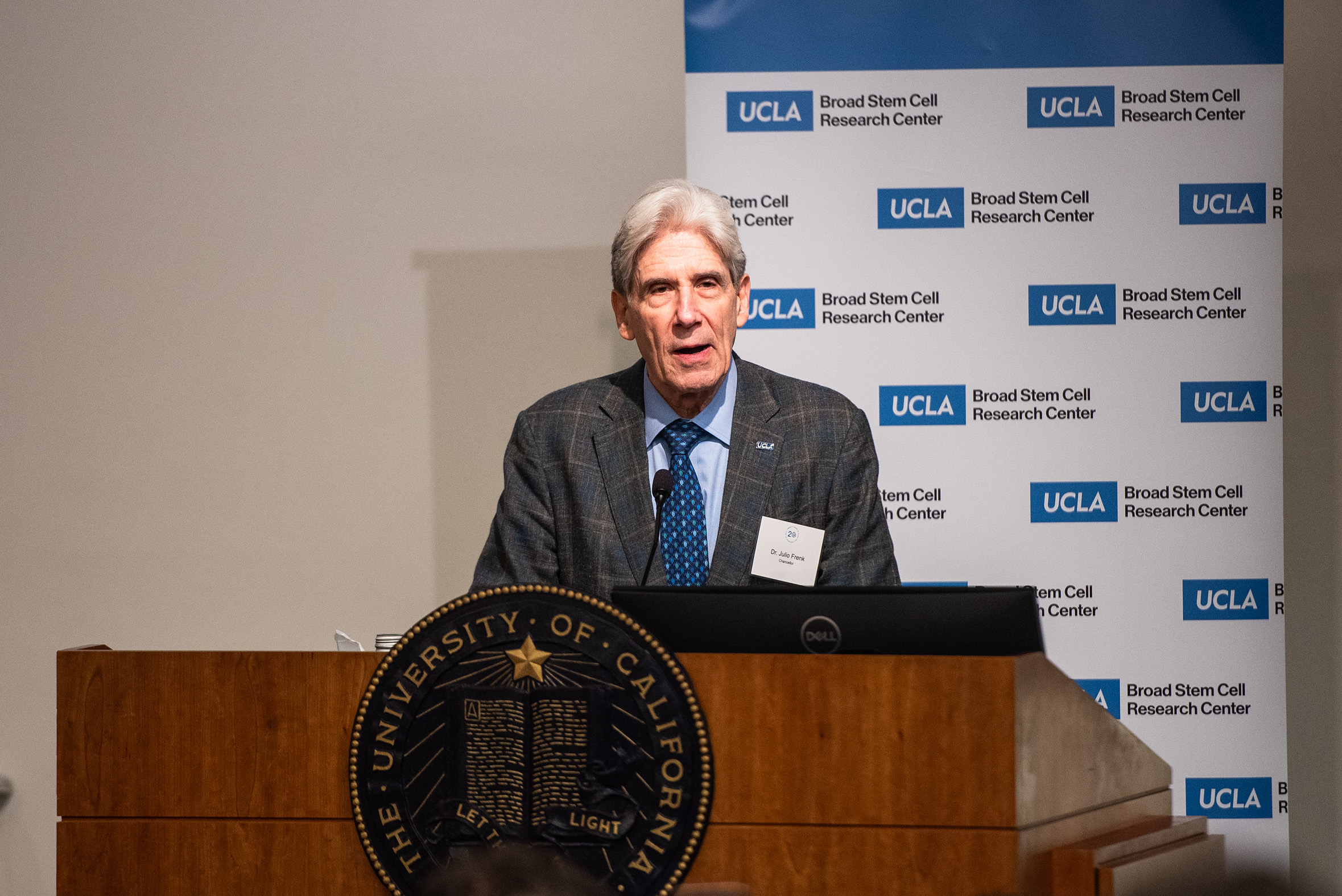Celebrating women in science: UCLA symposium marks 20 years of stem cell center
Scientists and students gathered for the UCLA Broad Stem Cell Research Center’s inaugural Women in Stem Cell Science Symposium. (Jeannie Kim/Daily Bruin senior staff)
By Charlie Hamilton
March 31, 2025 11:46 p.m.
This post was updated April 6 at 11:31 p.m.
Scientists and students gathered for the UCLA Broad Stem Cell Research Center’s inaugural Women in Stem Cell Science Symposium on March 6.
The center hosted the symposium to celebrate the accomplishments of women in stem cell research and mark the center’s 20th anniversary. The event featured UCLA stem cell scientists such as Aparna Bhaduri, Yvonne Chen and Amander Clark.
Chancellor Julio Frenk opened the event with a speech emphasizing the center’s achievements over the past 20 years. The center pushes science past theory into real-world applications, Frenk said in his speech.
He also said in his speech that not everyone currently has an equal opportunity to shape the future of science, as women make up only one-third of researchers worldwide – something the center is trying to change.
“This is a place of connection,” Frenk said. “We’re inspiring young girls from K-12, training the next generation of scientists and championing our female faculty and leaders.”

Celia Adelson, the center’s executive director and an organizer of the event, said many of the faculty the stem cell center first recruited 20 years ago were female scientists, and this event was a chance to highlight some of their research.
Judith Gasson, the symposium’s moderator and a professor emeritus of biological chemistry and medicine, said the symposium gave the stem cell center an opportunity to communicate better with the public about its research and its impact.
“You’ve seen the tip of the iceberg of our stem cell community here at UCLA, which has so many incredibly strong, internationally regarded women,” Gasson said.
Celina Yu, a fourth-year molecular, cell and developmental biology student, said the event provided her with insight about not only stem cell research but also a career in STEM and its opportunities.
During the symposium, Chen – a panelist and professor of microbiology, immunology and molecular genetics, said one challenge she has faced as a woman in stem cell research is balancing her time between research and outreach.
Her lab focuses on developing T-cell cancer therapies by engineering cells in the immune system to fight cancer, she said during the panel. As one of UCLA’s few female engineering faculty, Chen said she is constantly asked to be on committees and go to outreach events.
“They want the students to see a woman on stage so they can see a role model,” Chen said in response to a question at the event. “So it’s all coming from great places, but it does place a lot of extra demands on you when you also have to be doing everything else that any faculty members do.”
Bhaduri, an assistant professor in the department of biological chemistry and a panelist at the event, said she runs a research lab that studies human brain development and brain cancer. She added that the specialized stem cells that develop in the human brain have also been linked to brain cancer, and by studying them, her lab works to better understand and potentially find new treatments for brain cancer.
Bhaduri said her mentors have helped her navigate challenges she faced as a woman pursuing scientific research.
“I’ve been really inspired by the generation of men that I work with now,” she said. “There’s a lot less pushback against women in STEM and a lot more support.”
Chen added that her ideal future is one where gender does not make a difference in STEM.
“We should strive for equity, even if it’s not equality,” she said. “(I hope) that we find ways to leverage everybody’s unique strengths.”
Azra Cruz, a fourth-year molecular, cell and developmental biology student and member of Clark’s lab, said the event taught her that despite facing challenges as a woman in STEM, there will always be people to lean on for support.
“If anyone can attend more events like these, I would highly recommend it,” she added.
During the symposium, Gasson also said the stem cell center has allowed people to achieve more than they ever imagined to be possible.
“There is truly something magical about having an idea, designing an experiment and in that moment to be the very first person that has a bit of knowledge,” she said at the symposium.
